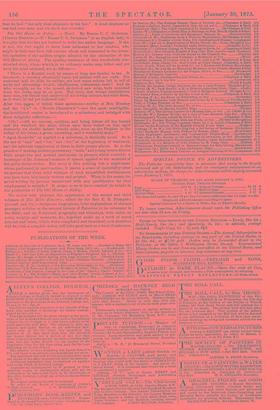The Old House at Aiding : a Novel. By Emma
C. C. Steinman. (Tinsley Brothers.)—If "Emma C. C. Steinman " is an English lady, it is a pity that she has not learned to write her native language. If she is not, the fact ought to have been intimated to her readers, who might in that case have felt curious about and interested in the eccen- tric imitation of our modern tongue adopted by the chronicler of the Old House at Aiding. The opening sentences of this wonderfully con- structed story, whos3 windings no ordinary reader may follow and yet keep his mind undazed, are as follows :— " There is a Kentish road, by reason of long use familar to me. It intersects a country absolutely rural, yet neither wild nor rude. For scattered 'mid its hills, its valleys, are how many tokens left to tell of early and abounding wealth, intelligence, refinement, taste ! And he who wrought, as he who mused, projected, saw arise, hath vanished from the scene, may be as dust. But time, that brings annihilation unto man, yet blends and mellows all his loving labours, and tints them, as it were, of sad yet hallowed hue."
After two tams, of which these sentences—worthy of Mrs. Hominy and the "L's" in "Martin Chuzzlewit "—are the most intelligible, the bewildered reader is introduced to a milestone, and indulged with these delightful reflections: " Oh ! could we recover, quicken, and bring hither all the buried and the wrecked, the slain, whose eyes have rested on this aged chronicle, we should indeed behold arise, even as the Prophet in the valley of dry bones, a great, exceeding, and a wonderful army!"
"Aged chronicle," as applied to a milestone, is decidedly novel. So is the use of "and" and " but " and "for," at the beginning of sentences, and the habitual suppression of them in their proper places. So is the practice of making modern persons say " hath," and young lovers discuss their respective and mutual sentiments in phrases which resemble a burlesque of Dr. Johnson's manner of speech applied to the material of the polite letter-writer. The story is like nothing but a night-mare vision performed by marionettes; it leaves a sense of incredulity after its perusal that three solid volumes of such unqualified worthlessness can have been laboriously written and printed. When is the mania for novel-writing by persons nnendowed with any qualification for that employment to subside ? It seems to us to have reached its height in the production of The Old House at Aiding.


































 Previous page
Previous page